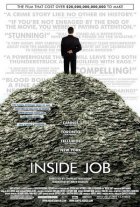
Inside Job Page #8
01:
47:22.04CHARLES FERGUSON: So this pattern of behavior, you think, extends to the senior
management of the firm.
Inside Job transcript – Sony Pictures – September 2010
36
JONATHAN ALPERT:
Absolutely does, yeah. I know for a fact that it does. It extendsto the very top.
01:
47:36.19{ALLAN SLOAN
SENIOR EDITOR:
FORTUNE MAGAZINE}
ALLAN SLOAN:
A friend of mine, who, who's involved in a company that has a bigfinancial presence, said: Well, it's about time you learned about subprime mortgages.
So he set up a session with his trading desk and me; and, and a techie, who, who did all
this – gets very excited; runs to his computer; pulls up, in about three seconds, this
Goldman Sachs issue of securities.
It was a complete disaster. Borrowers had borrowed, on average, 99.3 percent of the
price of the house. Which means they have no money in the house. If anything goes
wrong, they're gonna walk away from the mortgage.
01:
48:11.17 This is not a loan you'd really make, right? You've gotta be crazy.But somehow, you took 8,000 of these loans; and by the time the guys were done at
Goldman Sachs and the rating agencies, two-thirds of the loans were rated AAA, which
meant they were rated as safe as government securities. It's, it's utterly mad.
01:
48:33.18NARRATOR:
Goldman Sachs sold at least 3.1 billion dollars' worth of these toxic CDOsin the first half of 2006. The CEO of Goldman Sachs at this time was Henry Paulson,
the highest-paid CEO on Wall Street.
01:
48:49.19{MAY 30, 2006}
GEORGE W. BUSH:
{COUGH} Good morning, welcome to the White House. I ampleased to announce that I will nominate Henry Paulson to be the secretary of the
Treasury. He has a lifetime of business experience; he has an intimate knowledge of
financial markets; he has earned a reputation for candor and integrity.
01:
49:04.08Inside Job transcript – Sony Pictures – September 2010
37
NARRATOR:
You might think it would be hard for Paulson to adjust to a meagergovernment salary. But taking the job as Treasury secretary was the best financial
decision of his life.
Paulson had to sell his 485 million dollars of Goldman stock when he went to work for
the government. But because of a law passed by the first President Bush, he didn't have
to pay any taxes on it. It saved him 50 million dollars.
01:
49:30.24{IN 2007, ALAN SLOAN PUBLISHED AN ARTICLE ABOUT
THE CDOs ISSUED DURING PAULSON'S LAST MONTHS AS CEO.}
ALLAN SLOAN:
The article came out in October of 2007. Already, a third of themortgages defaulted. Now, uh, most of them are goin'.
01:
49:49.16NARRATOR:
One group that had purchased these now-worthless securities was thePublic Employees Retirement System of Mississippi, which provides monthly benefits to
over 80,000 retirees. They lost millions of dollars, and are now suing Goldman Sachs.
{AVERAGE ANNUAL RETIREMENT BENEFITS
FOR A MISSISSIPPI PUBLIC EMPLOYEE: $18,750
AVERAGE ANNUAL COMPENSATION OF A
GOLDMAN SACHS EMPLOYEE: $600,000
HANK PAULSON'S COMPENSATION IN 2005: $31,000,000}
01:
50:19.27NARRATOR:
By late 2006, Goldman had taken things a step further. It didn't just selltoxic CDOs; it started actively betting against them at the same time it was telling
customers that they were high-quality investments.
01:
50:35.02 By purchasing credit default swaps from AIG, Goldman could bet againstCDOs it didn't own, and get paid when the CDOs failed.
01:
50:45.26ALLAN SLOAN:
I asked them if anybody called the customers, and said, you know, wedon't really like this kind of mortgage anymore, and we thought you ought to know, you
Inside Job transcript – Sony Pictures – September 2010
38
know. They, they didn't really say anything; but, you know, you could just feel the
laughter coming over the phone.
01:
51:01.11NARRATOR:
Goldman Sachs bought at least 22 billion dollars of credit default swapsfrom AIG. It was so much that Goldman realized that AIG itself might go bankrupt; so
they spent 150 million dollars insuring themselves against AIG's potential collapse.
Then, in 2007, Goldman went even further. They started selling CDOs specifically
designed so that the more money their customers lost, the more money Goldman Sachs
made.
{GOLDMAN SACHS' CEO AND ALL OF ITS SENIOR
EXECUTIVES DECLINED TO BE INTERVIEWED FOR THIS FILM.}
{BUT IN APRIL 2010, THEY WERE FORCED
TO TESTIFY BEFORE CONGRESS.}
01:
51:36.08SEN. CARL LEVIN:
Six hundred million dollars; Timberwolf Securities is what you sold.Before you sold them, this is what your sales team were tellin' to each other.
Boy, that Timberwolf was one shitty deal.
01:
51:51.27{DANIEL SPARKS
FORMER MORTGAGES DEPARTMENT HEAD}
DANIEL SPARKS:
This was an e-mail to me in late June.SEN. CARL LEVIN:
Right. And you're callin' Timberwolf –DANIEL SPARKS:
After the transaction.SEN. CARL LEVIN:
No no; you sold Timberwolf after as well.DANIEL SPARKS:
W-, we did trades after that.SEN. CARL LEVIN:
Yeah, okay. The next e-mail; take a look; July 1, '07; tells the salesforce, "the top priority is Timberwolf."
Inside Job transcript – Sony Pictures – September 2010
39
01:
52:10.04 Your top priority to sell is that shitty deal. Uh, if you have an adverseinterest to your client, do you have the duty to disclose that to your client; to tell that
client of your adverse interest? That's my question.
DANIEL SPARKS:
M-, Mr. Chairman, just tryin' to understand -SEN. CARL LEVIN:
No, I think you understand it; I don't think you want to answer it.01:
52:25.28SEN. SUSAN COLLINS (R-ME): Do you believe that you have a duty to act in the best
interests of your clients?
{FABRICE TOURRE
EXECUTIVE DIRECTOR,
STRUCTURED PRODUCTS GROUP TRADING
GOLDMAN SACHS}
FABRICE TOURRE:
Again, uh, uh, Senator, I, I will repeat, you know, we have a, a dutyto, to serve our clients by showing prices on transaction where they ask us to show
prices for.
01:
52:43.01SEN. CARL LEVIN:
What do you think about selling securities which your own peoplethink are – crap? Does that bother you?
{LLOYD BLANKFEIN
CHAIRMAN & CEO
GOLDMAN SACHS}
LLOYD BLANKFEIN:
I think they would, again, as a hypothetical?SEN. CARL LEVIN:
No. This is real.LLOYD BLANKFEIN:
Well then I don't –SEN. CARL LEVIN:
We heard it today.LLOYD BLANKFEIN:
Well –SEN. CARL LEVIN:
We heard it today: this is a shitty deal, this is crap.LLOYD BLANKFEIN:
I, I, I heard nothing today that makes me think anything, um, wentwrong.
Inside Job transcript – Sony Pictures – September 2010
40
01:
53:08.09SEN. CARL LEVIN:
Is there not a conflict when you sell something to somebody, andthen are determined to bet against that same security; and you don't disclose that to the
person you're selling it –
LLOYD BLANKFEIN:
In the –SEN. CARL LEVIN:
Do you see a problem?LLOYD BLANKFEIN:
In the context of market-making, that is not a conflict.
Translation
Translate and read this script in other languages:
Select another language:
- - Select -
- 简体中文 (Chinese - Simplified)
- 繁體中文 (Chinese - Traditional)
- Español (Spanish)
- Esperanto (Esperanto)
- 日本語 (Japanese)
- Português (Portuguese)
- Deutsch (German)
- العربية (Arabic)
- Français (French)
- Русский (Russian)
- ಕನ್ನಡ (Kannada)
- 한국어 (Korean)
- עברית (Hebrew)
- Gaeilge (Irish)
- Українська (Ukrainian)
- اردو (Urdu)
- Magyar (Hungarian)
- मानक हिन्दी (Hindi)
- Indonesia (Indonesian)
- Italiano (Italian)
- தமிழ் (Tamil)
- Türkçe (Turkish)
- తెలుగు (Telugu)
- ภาษาไทย (Thai)
- Tiếng Việt (Vietnamese)
- Čeština (Czech)
- Polski (Polish)
- Bahasa Indonesia (Indonesian)
- Românește (Romanian)
- Nederlands (Dutch)
- Ελληνικά (Greek)
- Latinum (Latin)
- Svenska (Swedish)
- Dansk (Danish)
- Suomi (Finnish)
- فارسی (Persian)
- ייִדיש (Yiddish)
- հայերեն (Armenian)
- Norsk (Norwegian)
- English (English)
Citation
Use the citation below to add this screenplay to your bibliography:
Style:MLAChicagoAPA
"Inside Job" Scripts.com. STANDS4 LLC, 2025. Web. 23 Feb. 2025. <https://www.scripts.com/script/inside_job_42>.







Discuss this script with the community:
Report Comment
We're doing our best to make sure our content is useful, accurate and safe.
If by any chance you spot an inappropriate comment while navigating through our website please use this form to let us know, and we'll take care of it shortly.
Attachment
You need to be logged in to favorite.
Log In